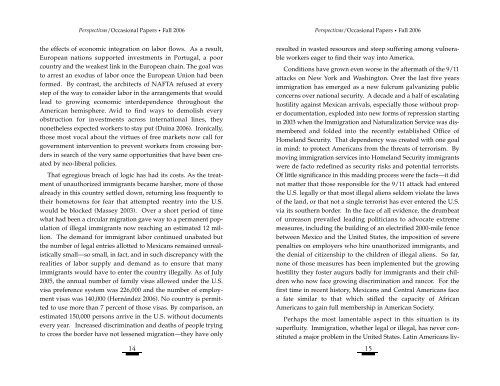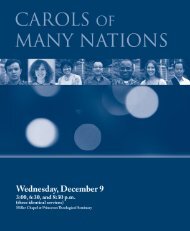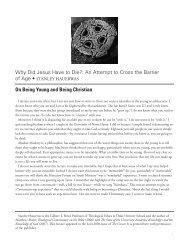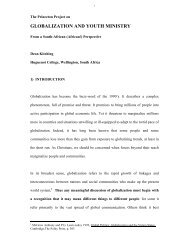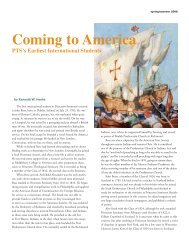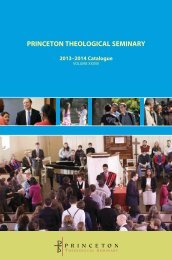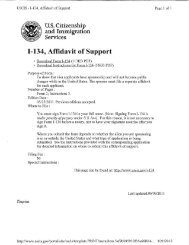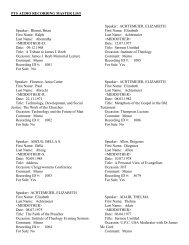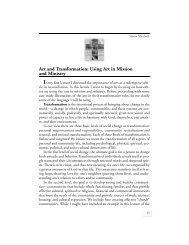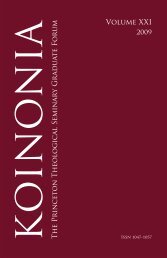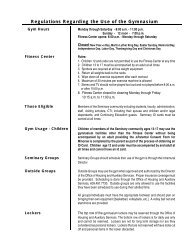P E R S P E C T I VAS - Princeton Theological Seminary
P E R S P E C T I VAS - Princeton Theological Seminary
P E R S P E C T I VAS - Princeton Theological Seminary
You also want an ePaper? Increase the reach of your titles
YUMPU automatically turns print PDFs into web optimized ePapers that Google loves.
Perspectivas/Occasional Papers • Fall 2006Perspectivas/Occasional Papers • Fall 2006the effects of economic integration on labor flows. As a result,European nations supported investments in Portugal, a poorcountry and the weakest link in the European chain. The goal wasto arrest an exodus of labor once the European Union had beenformed. By contrast, the architects of NAFTA refused at everystep of the way to consider labor in the arrangements that wouldlead to growing economic interdependence throughout theAmerican hemisphere. Avid to find ways to demolish everyo b s t ruction for investments across international lines, theynonetheless expected workers to stay put (Duina 2006). Ironically,those most vocal about the virtues of free markets now call forgovernment intervention to prevent workers from crossing bordersin search of the very same opportunities that have been createdby neo-liberal policies.That egregious breach of logic has had its costs. As the treatmentof unauthorized immigrants became harsher, more of thosealready in this country settled down, returning less frequently totheir hometowns for fear that attempted reentry into the U.S.would be blocked (Massey 2003). Over a short period of timewhat had been a circular migration gave way to a permanent populationof illegal immigrants now reaching an estimated 12 million.The demand for immigrant labor continued unabated butthe number of legal entries allotted to Mexicans remained unrealisticallysmall—so small, in fact, and in such discrepancy with therealities of labor supply and demand as to ensure that manyimmigrants would have to enter the country illegally. As of July2005, the annual number of family visas allowed under the U.S.visa preference system was 226,000 and the number of employmentvisas was 140,000 (Hernández 2006). No country is permittedto use more than 7 percent of those visas. By comparison, anestimated 150,000 persons arrive in the U.S. without documentsevery year. Increased discrimination and deaths of people tryingto cross the border have not lessened migration—they have only14resulted in wasted resources and steep suffering among vulnerableworkers eager to find their way into America.Conditions have grown even worse in the aftermath of the 9/11attacks on New York and Washington. Over the last five yearsimmigration has emerged as a new fulcrum galvanizing publicconcerns over national security. A decade and a half of escalatinghostility against Mexican arrivals, especially those without properdocumentation, exploded into new forms of repression startingin 2003 when the Immigration and Naturalization Service was dismemberedand folded into the recently established Office ofHomeland Security. That dependency was created with one goalin mind: to protect Americans from the threats of terrorism. Bymoving immigration services into Homeland Security immigrantswere de facto redefined as security risks and potential terrorists.Of little significance in this madding process were the facts—it didnot matter that those responsible for the 9/11 attack had enteredthe U.S. legally or that most illegal aliens seldom violate the lawsof the land, or that not a single terrorist has ever entered the U.S.via its southern border. In the face of all evidence, the drumbeatof unreason prevailed leading politicians to advocate extrememeasures, including the building of an electrified 2000-mile fencebetween Mexico and the United States, the imposition of severepenalties on employers who hire unauthorized immigrants, andthe denial of citizenship to the children of illegal aliens. So far,none of those measures has been implemented but the growinghostility they foster augurs badly for immigrants and their childrenwho now face growing discrimination and rancor. For thefirst time in recent history, Mexicans and Central Americans facea fate similar to that which stifled the capacity of A f r i c a nAmericans to gain full membership in American Society.Perhaps the most lamentable aspect in this situation is itssuperfluity. Immigration, whether legal or illegal, has never constituteda major problem in the United States. Latin Americans liv-15


